The Portopia Serial Murder Case Deserved So Much Better Than What It Got In 2023
By ZombiePie 9 Comments
Preamble
Back in the spring of 2023, Square Enix announced that they would be doing a remaster of The Portopia Serial Murder Case, and this remaster would feature the first "official" English language release of the game since it first graced the world in 1983. Initially, there was excitement among those in the visual novel enthusiast crowd. Unfortunately, that excitement was immediately dashed upon the reveal that the Portopia Renzoku Satsujin Jiken or The Portopia Serial Murder Case re-release would utilize AI and machine learning to generate art assets and localize the game. Moreover, Square Enix shared that an AI would scan and process player-written sentences in this release instead of the game using an in-game verb-noun parser, as in the original. Square Enix later clarified the technology used for their "AI Tech Preview" was a purely educational endeavor, would be released for free, and would mark the start of a partnership with the French-American company Hugging Face, Inc., to improve a "Natural Language Processing" database. You can check out the game's Steam page to read up on the details of what Square Enix planned, but be warned; it is pretty obvious they had an AI write the game's Steam page.
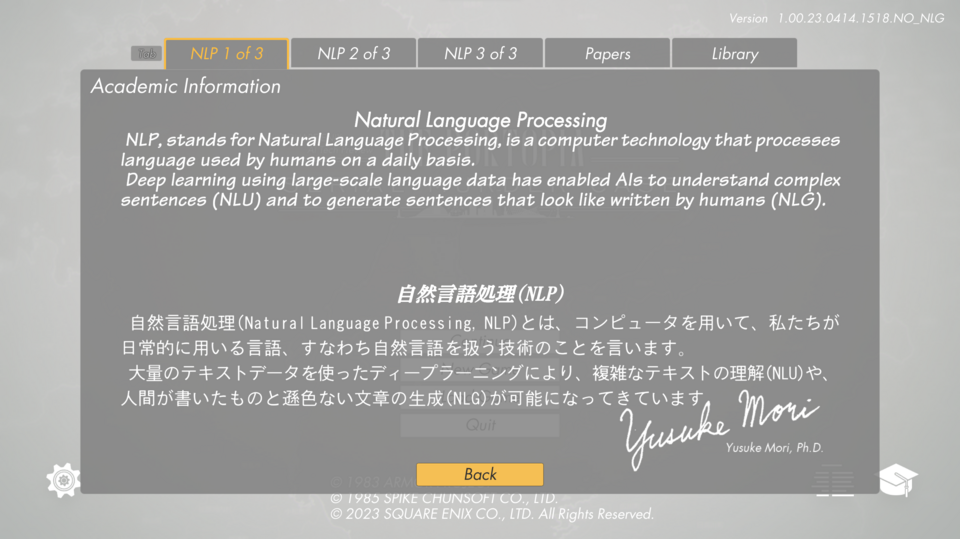
I won't lie and say I completely understand how this technology works in a perfect world. I can relay what Square Enix promised when they first announced this project and their publicly disclosed intentions. The AI technology Square Enix stated they would be using is categorized as a "Natural Language Process" (i.e., NLP). An NLP is a machine learning system that uses deep learning and text data sets to understand conversational rather than technical language. In this case, the use of an NLP system allows the game to understand player text inputs, parse out standard spelling and grammar mistakes, and permit the game to generate new responses to the player's information that did not exist before. I want everyone to know I wrote that sentence while gritting my teeth, as that's the "promise" in a best-case scenario. What advantages does this system pose to a simple verb-noun parser or an adventure game engine like SCUMM? In theory, players do not have to get specific about their verb-noun agreement and don't need to fuss with lines of logic that need to be location-specific as they need to be in classic adventure games like Zok, Maniac Mansion, and, in this case, Portopia. Likewise, the conjugation of verbs shouldn't pose an issue, with the root of the verb flagging the AI systems as interconnected inputs of equal value. Furthermore, this experiment was to become a series with additional classic titles getting a similar treatment in the future. Square Enix even created a "SQUARE ENIX AI Tech Preview" franchise page on Steam, suggesting as much. Being the early adopters of a lot of "cutting edge technology," Square Enix essentially used Portopia, a game with a short and simple script, as an experiment to see if they could cut out traditional localization third-party sources by opting for AI language systems.
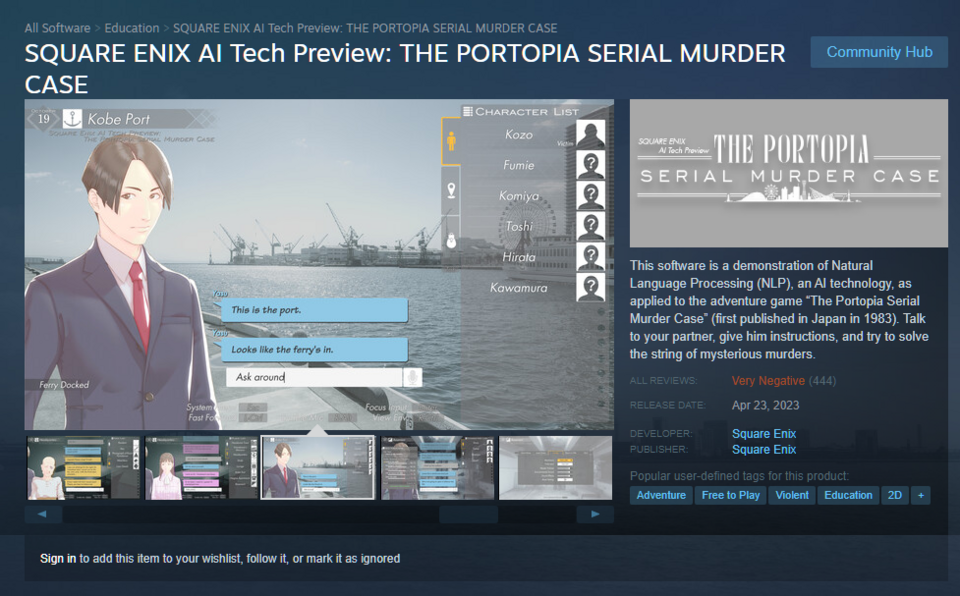
Or, that was the hope. If you check the page for this re-release I linked earlier, you can immediately see that this remains the lowest-reviewed game Square Enix has ever posted on Steam. The game met a massive backlash almost immediately upon its release for what some perceived as a lazy and exploitative use of AI to a classic video game that deserved better. This reaction was a mix of people against the use of AI for game development altogether, and those, like myself, who felt its use in this specific example was clunky, awkward, and led to a vastly inferior experience compared to the original game, which you STILL have to rely on fan translations if you want to play in non-Japanese languages. I played this "Tech Preview" at launch. I quickly grew frustrated with how its language processing worked and its inability to deliver on even some of its promises of detecting conversational language. Eventually, I defaulted to using simple verb-noun phrases as if I were playing a classic Zork text adventure circa the 1980s, and only then would the AI cooperate. I was not alone in this regard, and Square Enix announced shortly after the game's release that it viewed the AI Tech Preview as just that and would be working to improve the game over time. So, against my better judgment, I played the game this week, hoping that the large amounts of text data its AI got in subsequent months would result in a better experience. I hate to spoil things, but I was wrong.
You Need To Understand How Important The Portopia Serial Murder Case Is To The Japanese Games Industry To Appreciate This Tragedy
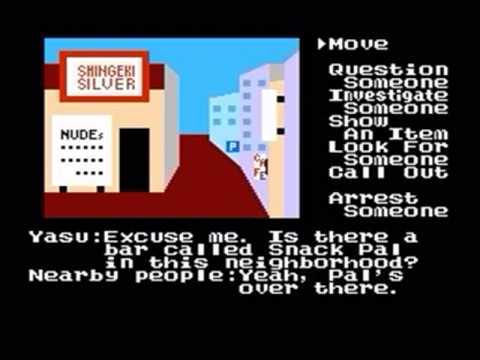
As I have repeatedly stated on this site and most recently on my blog, speculating about the messy development of Dragon Quest XII, Yuji Horii is a big deal. Though he is most commonly associated with Dragon Quest, it is essential to note that the second game he ever worked on was The Portopia Serial Murder Case (i.e., Portopia). Portopia is a seminal work in the history of video games in several regards. Foremost, it pioneered the visual novel genre and codified a gameplay template that persists today. To suggest that developers such as Spike Chunsoft, Capcom, Idea Factory, Key, Mages/5pb, Type-Moon, and even indie developers outside of Japan owe a debt of gratitude to Portopia and Yuji Horii is an understatement. The genre as it exists today is primarily thanks to Horii and Portopia taking Japan by storm and being a water-cooler conversation piece during the early phases of the Japanese bubble economy. It spawned dozens of cheap imitators, and some of the creators of those imitators are now industry standbys in the realm of visual novels. How we speak of Dune II establishing the template of the RTS game, World of Warcraft cementing the station of MMOs, Minecraft codifying video game crafting mechanics, Street Fighter II paving the way for the rise of fighting games, or Mario Bros pioneering platformers is how people rightfully talk about Portopia's legacy to modern visual novels.
Likewise, the game was groundbreaking at the time of its release. In Portopia, you are a detective in charge of investigating a murder. However, your player character does not collect clues or interrogate suspects directly. Instead, you command an assistant named Yasu to perform tasks by either typing directions into the game's word parser or, in the case of the Famicom release, navigating a verb command menu as you do in early point-and-click adventure games. The game takes place entirely in the first-person perspective and utilizes an early example of a nonlinear open-world gameplay structure. You are free to explore environments and collect clues in whatever order you wish, and the only "grade" or score to speak of is how quickly you can resolve the mystery. There's an in-game calendar; days pass as you travel to new destinations or return to old ones. The story also mimics the game's nonlinear format and provides an early example of a twist ending in video games. There's a reasonably in-depth cast of characters to interact with using Yasu, and each one has specific requirements for you to get their whole story. Oh, and by the way, all of this was conceived in 1981 and released in 1983 on the NEC PC-6000 series of home computers, which only sported a 3.8 MHz CPU and up to 32 KBs of RAM.
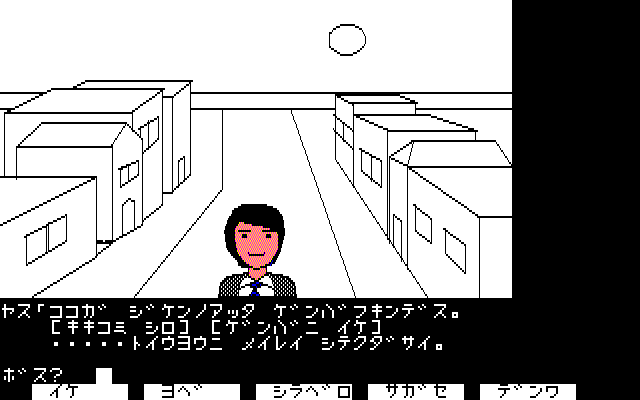
It was a highly ambitious title that immediately impacted the Japanese video game industry. It is a game with no "game over" and refused to force players into a losing state when that was standard practice. That design choice stuck with Nintendo's Eiji Aonuma, the current and longstanding figurehead behind the Legend of Zelda franchise. Aonuma has even gone on record saying that Portopia was the first game he ever played and was one of the primary reasons he entered video game development as a career. Hideo Kojima has echoed a similar sentiment in that he has called Portopia one of the three most important games to him and referred to its plot twist as something that helped form his style and voice with the stories he tells in his video games. If you enjoy Snatcher or Metal Gear Solid, understand that Hideo Kojima thinks those games were only possible with the release of Portopia. Its investigative and open-ended gameplay can even be found outside Japan with titles like ICOM's Déjà Vu. Still, the comparisons to Snatcher, 428: Shibuya Scramble, Ace Attorney, and Nine Hours, Nine Persons, Nine Doors are ones their developers are not coy about. People who know and respect the history of visual novels as a medium and art form have shown their utmost respect to both Horii and Portopia, which makes Square Enix's treatment of the IP all the more heinous.
There Are So Many Examples Of How To Do A Respectful Remaster Of A Classic Visual Novel, And Square Enix Followed None Of Them
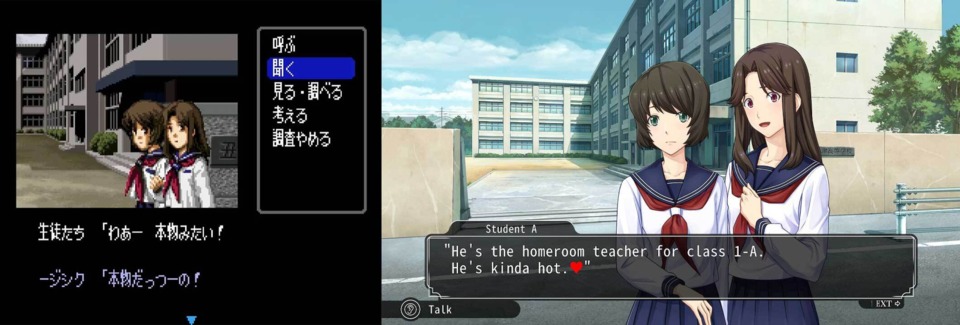
I want to throw things back to something I wrote in 2021 to lay out why Square Enix didn't have to take the course they did with Portopia. In 2021, we saw THREE English and European releases of long-demanded visual novels by Nintendo. Those games were The Great Ace Attorney: Adventures and The Great Ace Attorney 2: Resolve, which were put into a compilation pack titled "The Great Ace Attorney Chronicles," and Famicom Detective Club: The Missing Heir as well as Famicom Detective Club: The Girl Who Stands Behind. Both The Great Ace Attorney Chronicles and the two Switch remasters of Famicom Detective Club took the standard route of traditionally localizing their respective games with caveats and applying a new coat of paint to the original game's visuals. The second of those two steps is less pronounced with The Great Ace Attorney Chronicles than Famicom Detective Club, as it was only five to six years removed from its original release on the 3DS, but both games look leaps better than the first time we saw them. With the Famicom Detective Club Switch games, the remasters did not shy away from the sometimes crusty and antiquated gameplay structures and design of the original and kept them as is, which is both good and bad. Personally, I would leave the games the way they functioned in the past outside of bug fixes because, in the cases of Famicom Detective Club and Portopia, we are so far removed from their initial releases that you can only assume they are primarily going to catch the attention of hardcore fans that know what they are getting into.
And it is not as if this model for remastering a "classic" visual novel is an industry secret. Just this year, everyone in the visual novel community was jumping for joy that Tsukihime: A Piece Of Blue Glass Moon is coming to the West in 2024, and Square Enix, of all developers, published an incredibly well-done localization of Paranormasight: The Seven Mysteries of Honjo. So, what gives? Here's my theory. I think Square Enix took the entire script for Portopia, which is not that much, and then ran that script through an AI language algorithm, proofread what the AI spat out once or twice, and then published the result to see if such an "easy" turnaround could suffice as a game release for an older visual novel. With the message from consumers pretty clear that it is not, I think this "AI Tech Preview" franchise or experiment is dead. Now, why didn't Yuji Horii veto this experiment? Unfortunately, Horii has a personal weakness in this regard. Even when he first worked on the original game, he always wanted the Portopia games to be modeled and processed through an AI with natural language processing. While his primary passion has been fantasy, he is a slight sci-fi nerd regarding the possibilities of AI. On paper, this ill-fated project ticked all the right boxes for his interests, and he probably signed off, hoping for his fantasies related to the technology to come true.
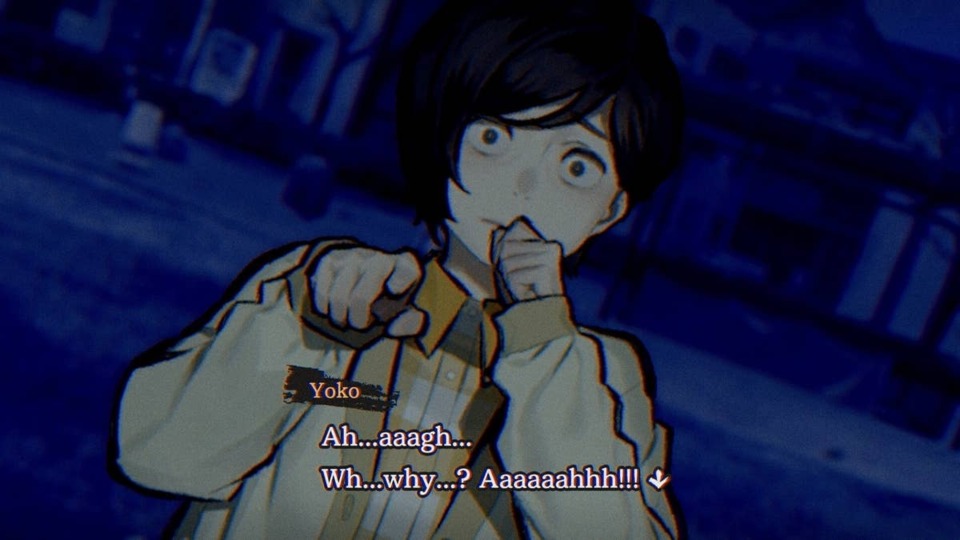
But what makes this game so bad from the onset? Why would someone like myself call it "damaged goods" from the get-go? First, let's talk about the art assets in this game. The backgrounds come from, wait for it, the "Kobe Tourism Bureau!" That's right, the re-release uses stock photo backgrounds licensed from the Japanese equivalent of The Chamber of Commerce! Now, I don't hate photo backgrounds as much as some in the visual novel enthusiast community and think plenty of examples (i.e., 428: Shibuya Scramble) have more than justified their use. The issue with Portopia using them is how the transparencies for the player UI layer on top of the backgrounds, which makes finding clues hidden in the environment a complete pain in the ass. Having the dialogue display in the center of the screen, rather than the bottom, like in the original, makes seeing objects on top of furniture and knowing to pick them up almost impossible. Worse, the backgrounds are muted in terms of their color palette, which means you can easily forget they are a critical part of the game. This version of the game tries to compensate for these problems by having a glowing star for every item you need to pick up. However, that bright star-shaped outline takes over the actual shape of the object, making it challenging to figure out what you need to type to pick it up.
Even if you want to humor the idea that the original Portopia needs some smoothing to its rougher edges, this AI Tech Preview promises as much and delivers on none of that. On the Steam page and in the previous press releases, Square Enix said that the AI they used should allow for natural conversations beyond the original script. And let me tell you, that's complete bullshit! Every time I tried to press Yasu to deviate from the original course of the story, he just acted flummoxed and stared blankly. What happens when you ask Yasu or any named characters how they are doing or feeling? The game doesn't have anything for you. Trying to query Yasu to reveal additional details beyond the original script, like asking him for motives, if victims have relationships, or where he was before the murder investigation started, dole a big old goose egg. I have a reputation for reveling in histrionics, but this re-release is fraudulent. It is neither a respectful homage or remake of the original, nor does it use modern technology to make the original more accessible or entertaining to new prospective audiences. Also, why did they pick the Sharp X1 version of the game from 1983? This port is neither the original game nor the far more popular Famicom version with the verb point-and-click grid. Suppose Square Enix was afraid of people not knowing how to play Portopia because of its parser use. Why didn't they opt for the Famicom versions' more familiar graphic adventure format?
This Game Was SO ROUGH At Launch, But Has The Generative AI Gotten Better Over Time As Promised?
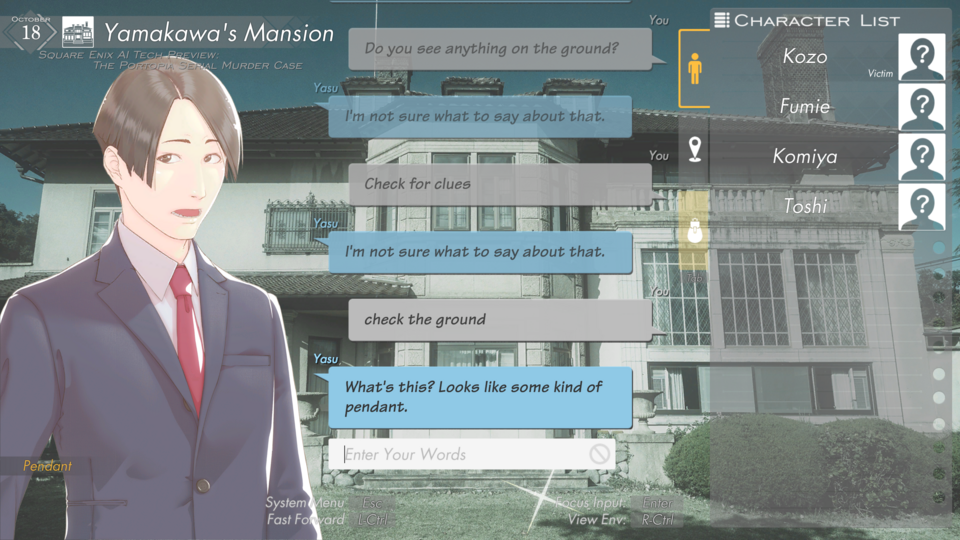
No. Square Enix and their AI partner, Hugging Face, promised that the game would only get better with more data, but my experience suggests otherwise. The same issues with sentence structure and verb-noun agreement that existed when the game launched months ago STILL exist today! Whether this is a sign that Square Enix stopped paying their bills to their partner or this is ANOTHER EXAMPLE of them jumping on new technology and abandoning it in record time is anyone's guess. There are almost too many issues to list. The most significant problem is that using conversational language, which the game encourages you to use, does not work. Instead, you need to limit your vocabulary to virtually the same style of simplified verb-noun sentences that worked in the original game. For example, at the start of the game, saying "Let's go to the crime scene" or "Take me to the crime scene" doesn't work, and Yasu repeats one of five possible dialogue prompts, indicating that he doesn't understand what you want him to do. What does work is "go to crime scene," all in lowercase, WHICH IS WHAT YOU TYPED IN THE ORIGINAL GAME!
If you don't play this game with a guide, you practically must start everything you type with a verb, or the AI won't understand what you are sending. With the original, the game engine checked your included verbs and nouns using a basic word check, but with this AI checking for basic grammar and conjugation, it is shockingly more brutal to work with. Worse, you'd think an AI would help in pruning the often fickle noun selection the original game often relied on, but it doesn't. Sometimes, you need to type "ground" and other times, "floor" to find clues on the surface of new rooms, but you can't use the terms interchangeably, and there's no rhyme or reason when that's the case. To issue one positive takeaway, you no longer need to worry about including character-specific language in your sentences in certain circumstances. The clearest example comes when you attempt to interrogate suspects and need to take photographs of them. You can take these photographs by typing "take a photo" and hitting enter.
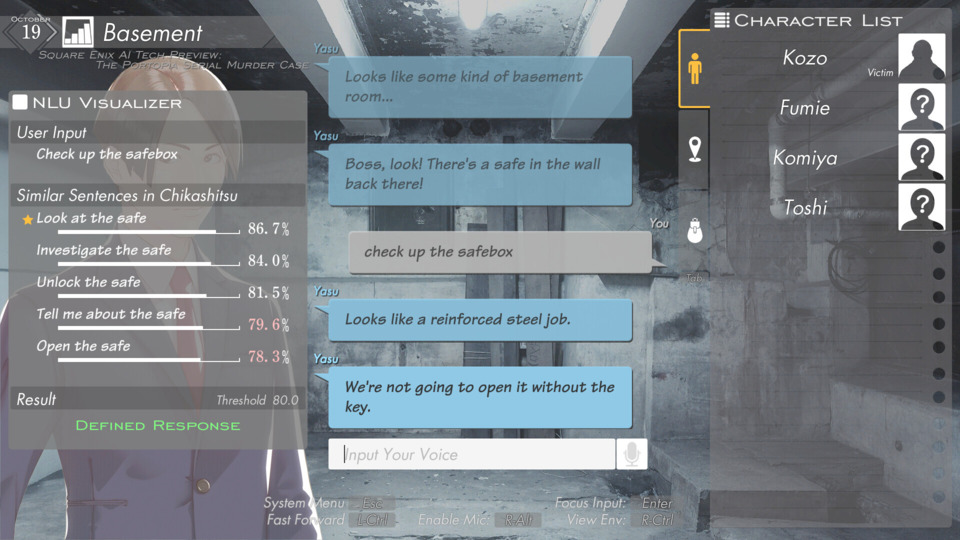
However, this point returns me to the issue of how limited the language model in this game feels. Below is a list of "valid" ways to start sentences in the "AI Tech Preview" version of Portopia. To clarify, I recorded notes during my first playthrough when this first launched and during my second playthrough this month of the valid verbs the game understands. I have noted any new words added to the game's databank I experienced by bolding the word. Unbolded words are verbs or sentence starters that existed in the initial release. Full disclosure: There are likely ways to use some of these verbs where they are not the initial part of valid phrases. Also, there's no way for me to experience every possible correct input in this game. Nonetheless, these are the known verbs the AI can process, I was able to find, and, in general, if you deviate from these, you will more than likely end up with a confused Yasu complaining that he doesn't understand what you are saying. So, this modern release can detect:
- Tell me...
- Go to...
- Go... (item retrieval command commonly followed by "get" or "pick up")
- Go back... (location-based command)
- Ask around...
- Call...
- Check...
- Investigate...
- Open...
- Tell...
- Look at...
- Take...
- Read...
- Press...
- Use...
- Unlock...
- Call in...
- Ask about...
- Arrest...
- Dial...
- What is... - (This is the only commonly used or recommended sentence starter I could reliably use that did not start with a verb or character's name).
- Hit...
- Show...
- Search...
- Knock on...
- Shout...
- Take off your shirt.
There are a few things I want to discuss about this list. First, notice how few valid verbs there are in the game. Maybe I missed a few here and there, but even with the power of AI, it is only a handful more than the original game's text parser, which raises the question of why Square Enix went this route even more. If their new technology is not elevating the original script even the slightest bit, why not give people a traditionally localized version of Portopia, warts and all? Second, since playing the game, I could only detect a single example of the game improving its databank of verbs or sentences. Near the end of the game, instead of "investigate the diary," you now need to type "read the diary." So, the one update to the game I found modified a required action to use a single-use or limited-use verb (i.e., "read") when it previously used the more ubiquitous in-game verb "investigate." The one example I could find of the AI changing the game's scripting is an example of it making the game HARDER TO PLAY!
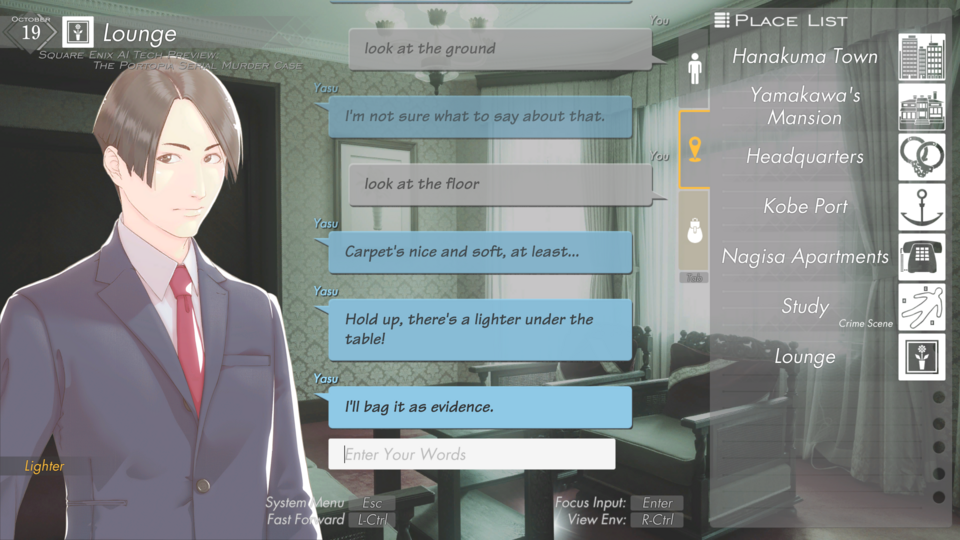
Of All Things, They Did Not Touch Or Change The Ending
Nevertheless, one creative decision by Square Enix related to the 2023 release of Portopia errs ever so closely to respectability. Regardless of how involved the AI language model becomes or has been, Square Enix has left the ending of Portopia entirely untouched. This decision is both a blessing and a curse. For video game historians, it is a triumph as, as I suggested earlier, the game's conclusion is an early example of a twist ending, much like The Cabinet of Dr. Caligari is to film. Nonetheless, for most, this decision is a curse as getting the game's "true ending" is as inscrutable and unintuitive as it was in 1983. For those with no idea what I am talking about, let's get into it. However, be warned, this next point is a massive spoiler, but at the same time, you need to know this because there's no logical way to complete Portopia. After you reach the end of the game and have collected every clue there is, the story ends on what you at first assume is a cliffhanger. The initial murder case spirals into a serial murder, hence the game's title. Nonetheless, all of your tips and possible suspects lead to dead ends. The case goes "cold," and you are left with an empty feeling that you have failed. Because the game has no fail states or a proper "game over," many people who played the game in the 80s at first thought they needed to replay it and check for mistakes. Unfortunately for them, getting the game's ending is slightly more nefarious.
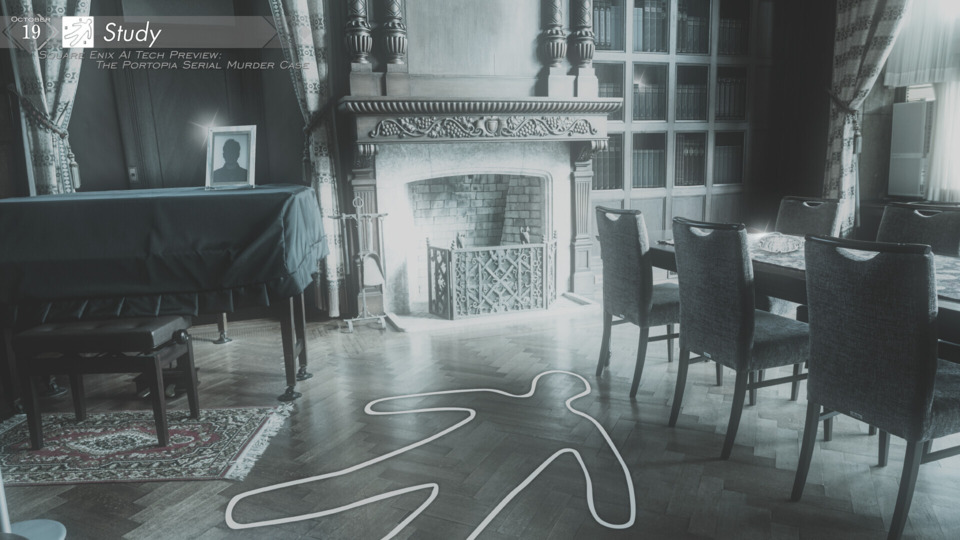
You see, throughout the game, you interview every named character but one. And it just so happens you learn from an earlier interrogation that one of the few leads you have about the suspect is that they have a scar or birthmark in the shape of a butterfly. You also know the lead suspect is male, and you find nothing if you request the other male characters strip off their shirts. By the time the case appears dead, you have searched everyone except for one character: Yasu. The person who performs all of your tasks is the only one who remains immune to your investigation, and when you reach the end of the game, he is also the one who encourages you to give up. He also knows everything about everyone, even when they shouldn't, and when you request he take off his shirt, he refuses. You have to type "take off your shirt" three times to get him to reveal his butterfly-shaped scar. The game's stand-in for its UI or parser was the villain. When Kojima says this is the game that inspired him to get into game development, this shocking revelation, as rudimentary as it might seem today, is what hooked him. The game's tutorial giver and personification of its gameplay betraying you? It was unbelievable then, and it is still a compelling idea today, considering how many games have utilized a similar plot device.
I love this plot twist, but don't get me wrong; it's still an incredibly contrived gameplay device! There's nothing in-game to direct you toward this solution, and even at the time, Portopia's ending was a source of derision and the butt-end of jokes. As the Giant Bomb wiki page for Portopia so succinctly explains, Portopia's ending was the source of a proto-gaming meme in Japan with people in Otaku and video game hobbyist circles shouting "Yasu is the culprit!" whenever the answer to an adventure game puzzle felt too illogical or weird for much of the 1980s and 1990s. Yasu was, for a moment, referred to as "Japan's most famous criminal," further laying out the indelible mark Portopia had in Japanese culture. The first Portopia was followed by Hokkaidou Rensa Satsujin: Ohotsuku ni Kiyu!!, which moved the setting from Kobe to Hokkaido and stuck with the point-and-click interface instead of the original noun-verb text parser. The second title in the trilogy is a much more fully realized dark and gritty detective story and makes well on many of the promises seen in the first Portopia. Also, depending on which port you play, it is an incredible-looking early 80s adventure game, though you need to rely on fan translations. The third game in the "Yuji Horii Mysteries" franchise is Karuizawa Yuukai Annai, which might go down in history as the weirdest video game Yuji Horii has ever made. It is a soft-core ecchi game with nudity and sexually suggestive content and plays like an action RPG, making it the weakest entry in the franchise.
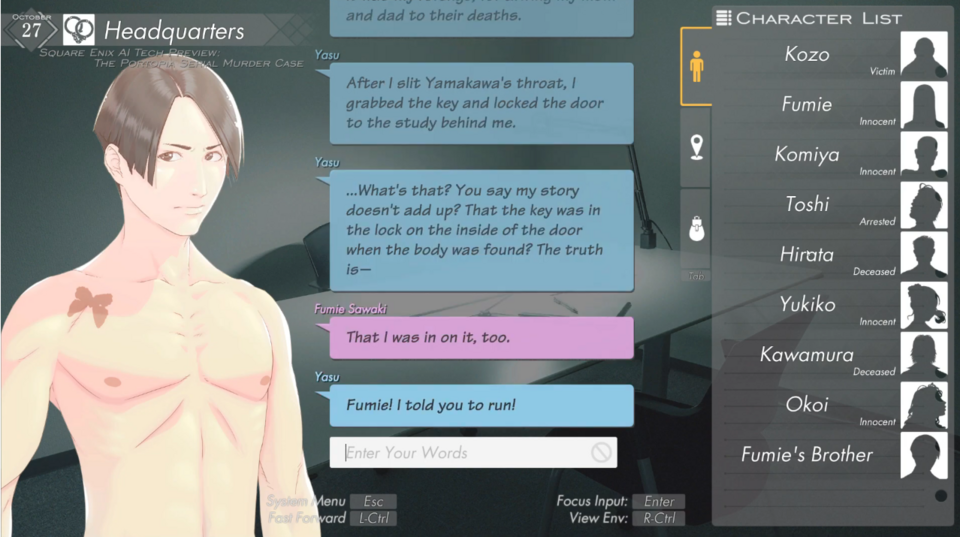
Nonetheless, please do yourself a favor and find one of the MANY fan translations of the original and have a go at playing it blind. Don't play this new AI-derived abomination Square Enix farted out as an experiment. Square Enix's shitty attempt to cut out the traditional localization channels sucks, and everyone who approved this project should be laughed at for thinking for even one second this would work. While The Portopia Serial Murder Case is not the gold standard for the visual novel genre, you can see so much of its DNA in Poroptia that it is one of the more eye-opening historical exercises you can have in video games. The fact that Horii pioneered not one but TWO genres that still stand as mainstays both in Japan and around the world lays out his case as one of the most influential figures in the industry, regardless of how you may feel about the current malaise with the state of the Dragon Quest franchise. With all that in mind, I hope you will join me in saying Portopia deserves better.
